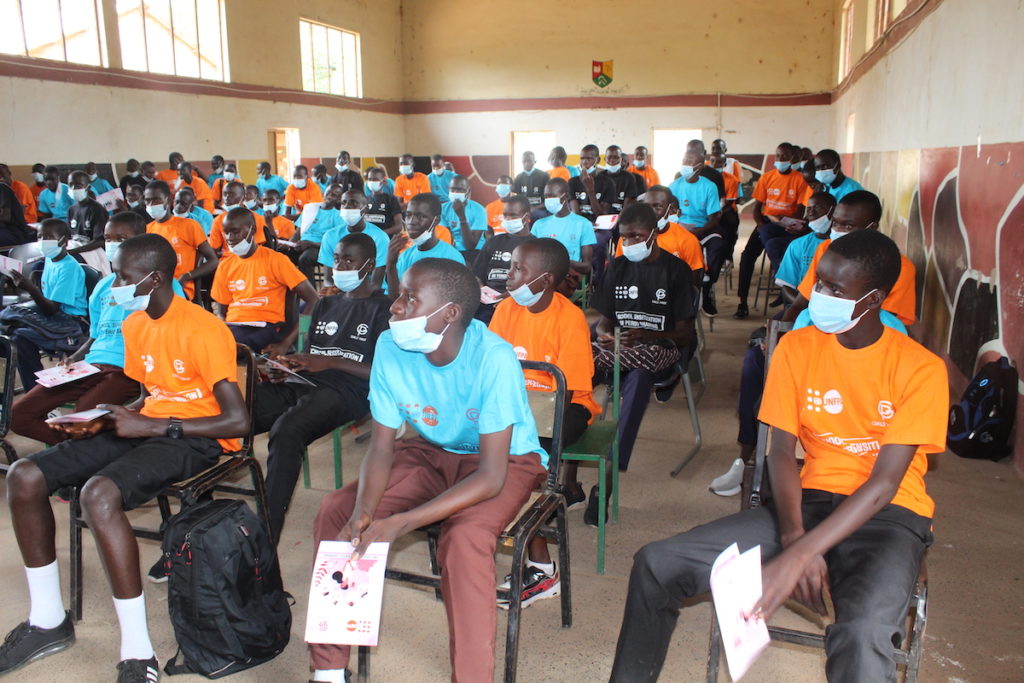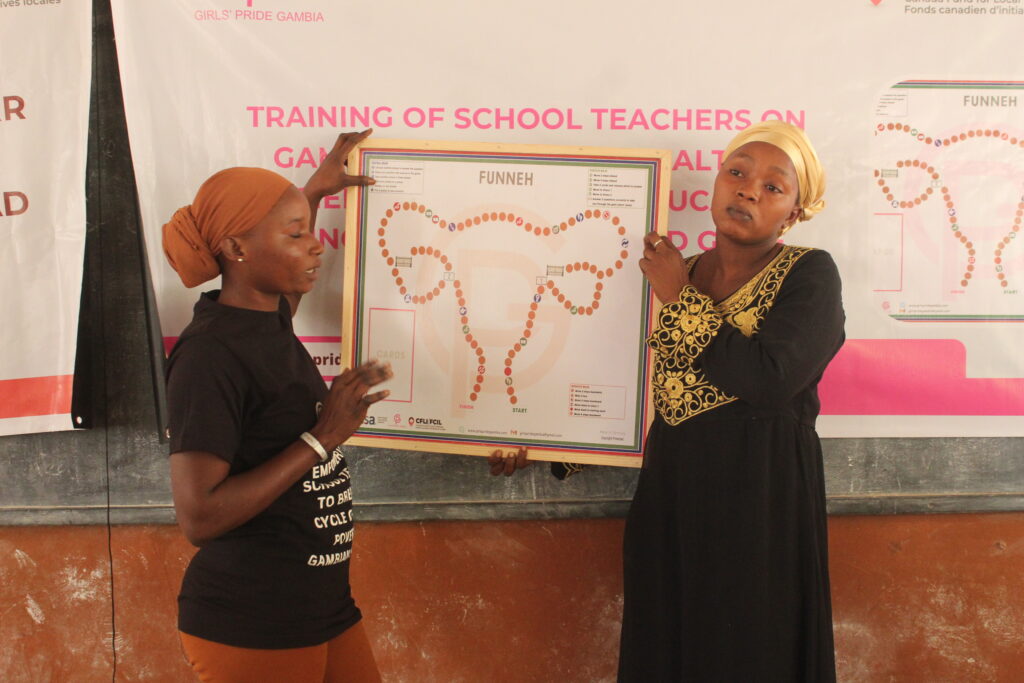Location: THE GAMBIA
Beneficiaries: women and girls
The Project
A few years ago, Fatoumatta Kassama met a woman named Sarah who would share a story that would have such an impact, it would change the course of her life. Sarah, a retired American teacher, has been working on a project that supports girls’ education in Kenya but she noticed that girls were missing school due to menstruation. Whether it was a lack of knowledge or proper materials like pads, girls were unable to go to class when they had their period. The effect was devastating as teachers do not repeat the lessons they’ve taught so girls would often fall behind or drop out of school altogether.
A nurse by profession, Fatoumatta thought back upon her own childhood in The Gambia acknowledging that periods had never been discussed. The only advice she’d received was from her Mom who said, “If you allow man to touch you, you will get pregnant.” No one ever bought sanitary pads for her. She would stain her school uniform with menstrual blood, miss lessons and get infections after her period. So, Fatoumatta felt called to change the situation and that desire led to the creation of Girls’ Pride, a hybrid organization that addresses period poverty, promotes maternal and child health, keeps girls in schools during their periods, ends gender-based violence and creates job opportunities for youth. They do this by providing reusable sanitary pads, training on menstrual hygiene management and other reproductive health issues, training of trainers on sexual and reproductive health, skills training on reusable sanitary pad production and counselling services.
 Initially, Fatoumatta contacted different companies in Africa that make reusable sanitary pads so that they could train her on how to make pads. Unfortunately, none of them agreed to provide that sort of assistance. Scouring the globe, she connected with women in Canada and the Philippines – all of whom wanted to help but who were unable to train her. Despite the obstacles, Fatoumatta did not give up. Through Youtube videos and material research, she taught herself to make pads and found proper materials in her country and abroad.
Initially, Fatoumatta contacted different companies in Africa that make reusable sanitary pads so that they could train her on how to make pads. Unfortunately, none of them agreed to provide that sort of assistance. Scouring the globe, she connected with women in Canada and the Philippines – all of whom wanted to help but who were unable to train her. Despite the obstacles, Fatoumatta did not give up. Through Youtube videos and material research, she taught herself to make pads and found proper materials in her country and abroad.
“It took awhile to make something that looked like a pad. Sometimes you are so embarrassed that you don’t even want to share with the person next to you, the one who would be sewing it next because of how it looked. The mistakes were funny,” Fatoumatta laughed.
After creating her initial prototype, Fatoumatta was inspired to start a social movement and decided to create a charity to train others.
“It’s amazing, I’m surprised when people want to learn how to make a pad,” she said.

Girls’ Pride has trained 35 women and girls in her community on how to make reusable pads. They have also trained 26 teachers from different schools in The Gambia on how to make reusable pads and then they taught their students. In the Home Economics course, girls learn how to sew baby dresses and tablecloths but now they also learn how to sew handmade reusable sanitary pads as their practical work in schools.This training was coordinated by the CHE project funded by IDRC. Upon completion of the weeklong training, The Pretty Girls Corner Project was initiated. Some schools provide disposable pads to students but others do not supply pads. Through the Pretty Girls Corner project, students sew handmade reusable pads for themselves and for their peers. Each student makes a total of ten pads – they take five of the pads for themselves and the rest is handed over to the teacher who keeps them in the school. Pad Banks were created in schools as a space to house the pads that are left in the school. Girls who get their periods while in school go to the pad banks to get free, reusable pads. Teachers also include boys in the Home Economics courses and pad making too. They are encouraged to sew pads for their sisters in the school and in their communities. This allows them to see periods as something normal and they will be able to talk to their wives and daughters about periods when they grow up.
‘’To eradicate the taboo around menstruation, men and boys should be included in our programs,’’ Fatoumatta shared.
Fatoumatta explained that in providing training in schools, teachers not only address the issues of menstruation and taboo around it, they create more understanding which helps toward ending gender-based violence. As teachers become experts in schools, Fatoumatta and her team focus on girls and boys who are not going to school. By normalizing conversions around periods, family planning and other sexual and reproductive health issues, they are changing the narratives for this entire generation.

The Impact of the Seed Grant
During the Covid-19 pandemic, Fatoumatta’s vision for how to help women expanded even further.
As businesses closed and families were unable to visit those in prison, she began to wonder what was happening to the female prisoners. Without family to bring needed supplies, how would these women get pads? Fatoumatta reached out to a prison medic she knew who confirmed that the women needed help.
“My team and I wanted to provide sanitary products for the women in prison enough for 2 years. We started to look for grants and found The Pollination Project. I decided to give it a try and apply and luckily we got the grant.
The grant allowed Fatoumatta to create “Dignity Kits” with 5 reusable pads, 5 underwears in each pack and a packet of soap. They could not go to the prison to teach the women so they made a video with instructions and shared it with the contact person who showed it to women in prison so they’d know how to care for themselves.
Female prisoners now can have their periods in dignity without shame or fear due to lack of adequate sanitary pads. Through this project, our beneficiaries gained adequate knowledge on menstruation, how to use and care for reusable sanitary pads safely and hygienically.
The Present and the Future

They also established Reusable Pad Banks in 50 schools and 25 remote villages across rural Gambia. These pad banks will provide eco-friendly and reusable pads to women and girls, allowing them to manage their periods with dignity while protecting their environment from menstrual waste. Additionally, schoolboys in the Lower River Region were taught how to make reusable pads, and they are now using their skills to supply pads to the established pad banks in their schools.

In addition, Fatoumatta developed the Funneh board game on menstruation. The goal of the board game is to educate young people and adults on MHHM and other Sexual and Reproductive Health and Rights (SRHR) issues. For this year’s Menstrual Hygiene Day celebration, in collaboration with the Comprehensive Health Education project under the Ministry of Basic and Secondary Education and our partners, they have organized a Funneh board game inter-school competition. This competition involves 10 junior schools and 10 senior schools in Region 1 of The Gambia, focusing on MHHM.
As Fatoumatta expands the reach of Girls’ Pride, she uses one of her greatest Superpowers – the ability to inspire communication and conversation in spaces it has not previously existed – and in doing so, she improves the lives of this generation and all to come.
Follow the project:
https://x.com/GirlsPrideGam
https://www.instagram.com/girlspridegambia
https://www.facebook.com/girlspridegambia/
Fatoumatta L Kassama
 Fatoumatta Kassama is a Registered Nurse and the Co-Founder of Prospect For Girls, a community organization that empowers women and girls through vocational skills training and health education. Fatoumatta is the proprietor of Girl’s Pride, a social enterprise that provides reusable sanitary products in The Gambia. She is also the Founder and coordinator of Eye Care for All. Fatoumatta is passionate about women’s reproductive health rights, and she empowers women and girls through reproductive health education.
Fatoumatta Kassama is a Registered Nurse and the Co-Founder of Prospect For Girls, a community organization that empowers women and girls through vocational skills training and health education. Fatoumatta is the proprietor of Girl’s Pride, a social enterprise that provides reusable sanitary products in The Gambia. She is also the Founder and coordinator of Eye Care for All. Fatoumatta is passionate about women’s reproductive health rights, and she empowers women and girls through reproductive health education.
